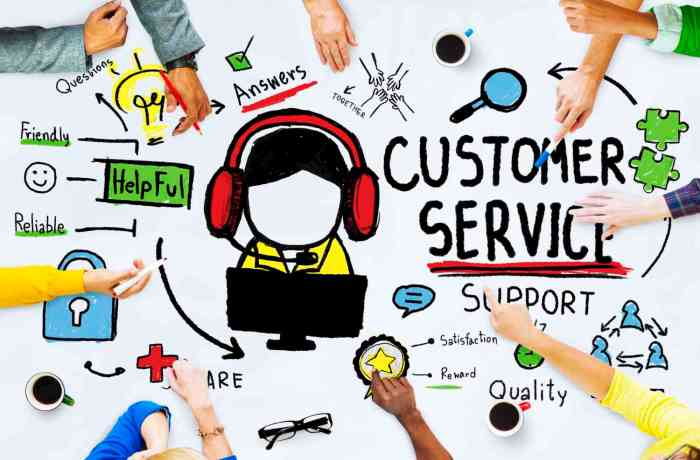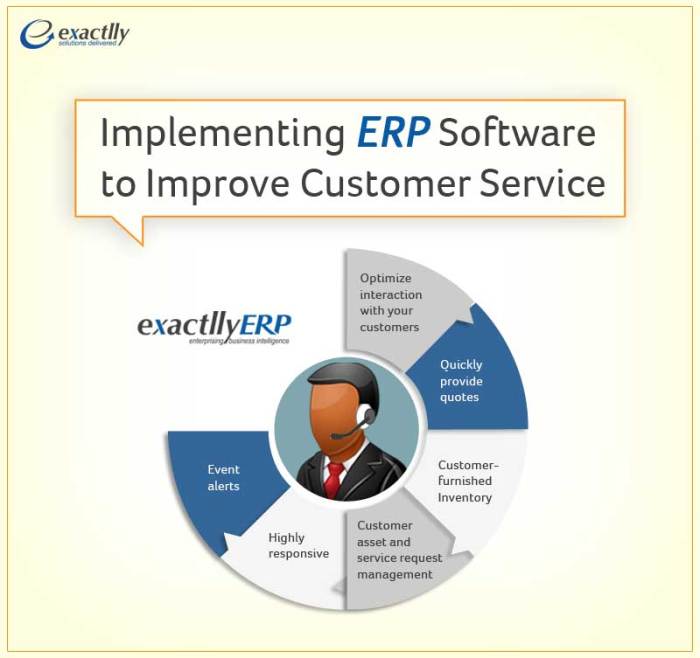How ERP systems improve customer service and satisfaction is a question that many businesses are asking today. In an increasingly competitive market, businesses are looking for ways to stand out from the crowd and provide exceptional customer experiences. ERP systems offer a powerful solution by providing a centralized platform for managing all aspects of customer interactions, from sales and marketing to order fulfillment and support.
By integrating data from various departments, ERP systems create a comprehensive view of each customer. This data can be used to personalize marketing campaigns, provide targeted support, and streamline order processing. As a result, businesses can offer a more seamless and satisfying customer experience, leading to increased loyalty and repeat business.
Enhanced Customer Data Visibility

One of the key ways ERP systems enhance customer service and satisfaction is by providing a comprehensive view of customer data. This data is collected from various departments within an organization, including sales, marketing, customer service, and finance. By consolidating this information into a single system, ERP solutions enable businesses to gain a holistic understanding of their customers.
Benefits of Centralized Customer Data, How ERP systems improve customer service and satisfaction
Having a centralized view of customer interactions, orders, and preferences offers several advantages:
- Improved Customer Understanding: With access to a complete customer history, businesses can gain a deeper understanding of their customers’ needs, preferences, and past interactions. This knowledge allows for more personalized and targeted service.
- Enhanced Communication and Collaboration: Centralized customer data facilitates seamless communication and collaboration among different departments. Sales teams can access customer service records to understand past issues, while marketing teams can leverage order history to personalize campaigns.
- Reduced Errors and Duplication: By eliminating data silos, ERP systems minimize the risk of errors and duplication. This leads to more efficient operations and improved customer satisfaction.
Personalizing Customer Experiences
The insights gained from consolidated customer data can be used to personalize customer experiences in various ways:
- Targeted Marketing Campaigns: By analyzing customer purchase history and preferences, businesses can tailor marketing messages and promotions to individual customers, increasing the effectiveness of campaigns.
- Personalized Product Recommendations: ERP systems can analyze customer purchase history and browsing behavior to recommend relevant products and services, enhancing the shopping experience and driving sales.
- Proactive Customer Service: By identifying patterns in customer interactions and complaints, businesses can proactively address potential issues before they escalate, improving customer satisfaction and loyalty.
Streamlined Order Fulfillment
ERP systems play a crucial role in optimizing order fulfillment processes, leading to improved customer satisfaction. By automating various tasks and providing real-time visibility into inventory and order status, ERP systems ensure swift and accurate order processing and delivery.
Automation of Order Processing and Fulfillment
ERP systems automate many manual tasks involved in order processing and fulfillment, such as order entry, inventory allocation, and shipping. This automation streamlines the entire process, reducing errors and delays. For example, when a customer places an order, the ERP system automatically verifies inventory availability, generates invoices, and schedules shipments. This automated workflow minimizes human intervention, leading to faster order processing times and reduced administrative overhead.
Real-Time Inventory Tracking
Real-time inventory tracking is a key feature of ERP systems that significantly impacts order fulfillment. ERP systems provide a centralized view of inventory levels across all locations, allowing businesses to track stock in real-time. This visibility helps businesses avoid stockouts, ensure accurate order fulfillment, and optimize inventory management.
Impact of Efficient Order Management on Customer Satisfaction
Efficient order management is crucial for customer satisfaction. Customers expect their orders to be processed and delivered quickly and accurately. ERP systems facilitate efficient order management by providing tools for:
- Tracking order status in real-time
- Managing customer expectations with timely updates
- Resolving order issues promptly
By streamlining order fulfillment processes and providing timely information to customers, ERP systems enhance customer satisfaction and build trust.
Improved Communication and Collaboration: How ERP Systems Improve Customer Service And Satisfaction
ERP systems are not just about managing data; they’re about fostering better communication and collaboration within an organization, especially when it comes to customer service. By connecting different departments and providing real-time access to information, ERP systems create a more efficient and customer-centric environment.
Real-Time Access to Customer Information
Having real-time access to customer information is a game-changer for customer service representatives. Imagine a customer calling with a question about an order. Instead of transferring them to different departments or searching through multiple systems, the representative can instantly access all relevant information, such as order status, past interactions, and product details, right from their screen. This not only saves time but also allows for a more personalized and informed interaction.
Personalized Customer Interactions
ERP systems provide a comprehensive view of customer data, enabling businesses to tailor their marketing and communication strategies for individual preferences. This personalized approach fosters stronger customer relationships and increases satisfaction.
Customer Segmentation Based on Data Insights
ERP systems gather vast amounts of customer data, such as purchase history, demographics, and interactions with the company. This data can be analyzed to segment customers into groups with similar characteristics and needs. By understanding these segments, businesses can create targeted marketing campaigns and tailor their offerings to specific customer profiles.
- For example, a clothing retailer might segment customers based on age, gender, and spending habits. They could then offer personalized discounts or promotions to specific groups, such as a 20% off coupon for young adults on their first purchase of athletic wear or a free gift with purchase for loyal customers who spend over a certain amount.
- Similarly, a software company could segment customers based on their usage patterns and provide targeted support and training materials to address their specific needs. This personalized approach ensures that customers receive the information and assistance they need, leading to increased satisfaction and loyalty.
Examples of Personalized Offers, Promotions, and Support
Personalized customer interactions extend beyond marketing campaigns and encompass various aspects of the customer journey. ERP systems can enable businesses to provide tailored offers, promotions, and support based on individual customer preferences and needs.
- A travel agency could offer personalized travel packages based on a customer’s previous destinations, interests, and budget. For instance, a customer who has previously booked beach vacations could be presented with a curated list of similar destinations, including special deals and promotions tailored to their preferences.
- An online retailer could provide personalized product recommendations based on a customer’s browsing history and purchase behavior. For example, a customer who has recently purchased a new laptop might receive recommendations for compatible accessories or software upgrades.
- A financial institution could offer personalized financial advice and support based on a customer’s financial goals and risk tolerance. For instance, a customer who is saving for retirement could receive tailored investment recommendations and guidance from a financial advisor.
Proactive Customer Support

ERP systems can be a powerful tool for proactive customer support, going beyond simply reacting to issues to anticipate and address them before they arise. By leveraging the vast amounts of data they collect and analyze, ERP systems can identify potential problems and trigger automated responses, ensuring a smoother and more satisfying customer experience.
Identifying Potential Customer Issues
ERP systems analyze data from various sources, including sales records, inventory levels, customer interactions, and service requests. This data analysis allows for the identification of patterns and trends that can indicate potential customer issues. For example, an increase in the number of returned products could signal a quality issue, while a spike in customer inquiries about a specific product might indicate a lack of clarity in product information.
Proactive Communication and Support
Once potential customer issues are identified, ERP systems can trigger proactive communication and support measures to prevent customer dissatisfaction. This can include:
- Sending automated emails or notifications to customers who may be experiencing delays in order fulfillment.
- Proactively reaching out to customers who have purchased products with known issues, offering solutions or updates.
- Providing personalized recommendations based on past purchase history or browsing behavior.
Automated Alerts and Notifications
ERP systems can be configured to send automated alerts and notifications to relevant teams or individuals when potential problems are detected. These alerts can include:
- Low Inventory Alerts: When inventory levels of a specific product fall below a predefined threshold, an alert is triggered, allowing the company to replenish stock before it runs out and customers experience delays.
- Shipping Delays: If a shipment is expected to be delayed, the system can automatically notify the customer, providing an estimated delivery date and an opportunity to adjust their expectations.
- Product Recall Notifications: In the event of a product recall, the system can automatically send notifications to affected customers, providing instructions on how to return the product or obtain a replacement.
Increased Customer Loyalty

Exceptional customer service is the cornerstone of building lasting customer loyalty. When businesses consistently deliver positive experiences, customers are more likely to become repeat buyers and advocates for the brand. ERP systems play a crucial role in this process by streamlining operations, enhancing communication, and providing valuable insights into customer behavior, ultimately fostering stronger customer relationships.
The Link Between Customer Service and Loyalty
The connection between excellent customer service and increased customer loyalty is undeniable. Satisfied customers are more likely to:
- Make repeat purchases
- Spend more money with the business
- Refer the business to friends and family
- Be less price-sensitive
- Remain loyal to the brand even during challenging times
These benefits translate into increased revenue, brand advocacy, and a competitive advantage for businesses. ERP systems empower businesses to achieve this by providing the tools and insights needed to consistently deliver exceptional customer service.
How ERP Systems Contribute to Building Strong Customer Relationships
ERP systems contribute to building strong customer relationships in several ways. By integrating various business processes, ERP systems provide a comprehensive view of customer interactions, enabling businesses to:
- Personalize customer experiences: By centralizing customer data, ERP systems allow businesses to understand individual customer preferences and tailor their interactions accordingly. This personalized approach fosters a sense of value and strengthens customer relationships.
- Proactively address customer needs: By analyzing customer data, ERP systems can identify potential issues or opportunities before they arise. This allows businesses to proactively reach out to customers, address concerns, and provide solutions, further strengthening customer relationships.
- Improve communication and collaboration: ERP systems enable seamless communication and collaboration between different departments, ensuring that customer requests are handled efficiently and consistently. This streamlined process reduces errors, minimizes wait times, and improves customer satisfaction.
- Track customer feedback and measure satisfaction: ERP systems provide tools for gathering and analyzing customer feedback, allowing businesses to identify areas for improvement and track the effectiveness of their customer service efforts. This data-driven approach helps businesses continuously enhance their customer service and build stronger relationships.
In conclusion, ERP systems are a valuable tool for businesses looking to improve customer service and satisfaction. By providing a centralized platform for managing customer data, automating processes, and facilitating communication, ERP systems empower businesses to deliver personalized and efficient customer experiences. With the right implementation and ongoing optimization, ERP systems can help businesses build stronger customer relationships, increase loyalty, and drive revenue growth.
FAQ Explained
What are the benefits of using an ERP system for customer service?
ERP systems offer a wide range of benefits for customer service, including improved data visibility, streamlined order fulfillment, enhanced communication, personalized interactions, and proactive support.
How can ERP systems help personalize customer experiences?
ERP systems enable businesses to personalize customer experiences by providing a centralized view of customer data, which can be used to segment customers and tailor marketing campaigns, support interactions, and product recommendations.
What are some examples of how ERP systems can improve customer communication?
ERP systems can improve customer communication by providing real-time access to customer information, automating email and SMS notifications, and facilitating seamless communication between departments involved in customer service.
How do ERP systems contribute to increased customer loyalty?
ERP systems contribute to increased customer loyalty by providing a superior customer experience, which leads to greater satisfaction and a higher likelihood of repeat business.